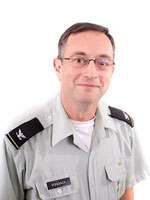Thursday, April 18
Votey 209; 4:30 PM
A Primer on Squigonometry
Robert Poodiack, Norwich University
 Abstract: Generalization and abstraction have always been part of the fiber of mathematics. To take something we have known to be true for a long time, a canonical equation, for example, and disassemble it, thoroughly examine it, and then reassemble it with some different parts is often the key to discovering structure. Doing this can often act as a gateway to a new mathematical world. This talk is an introduction to generalizations of concepts that students learn early in their mathematical careers about the definitions of distance, the unit circle, and the sine and cosine functions. We will see how a seemingly cosmetic change of the exponent in the equation for the unit circle has wide-reaching ripple effects, turning a circle into a squircle, and eventually enveloping the hyperbolic, exponential, and logarithmic functions. We will also see that squigonometry is a field ripe for exploration by undergraduates.
Abstract: Generalization and abstraction have always been part of the fiber of mathematics. To take something we have known to be true for a long time, a canonical equation, for example, and disassemble it, thoroughly examine it, and then reassemble it with some different parts is often the key to discovering structure. Doing this can often act as a gateway to a new mathematical world. This talk is an introduction to generalizations of concepts that students learn early in their mathematical careers about the definitions of distance, the unit circle, and the sine and cosine functions. We will see how a seemingly cosmetic change of the exponent in the equation for the unit circle has wide-reaching ripple effects, turning a circle into a squircle, and eventually enveloping the hyperbolic, exponential, and logarithmic functions. We will also see that squigonometry is a field ripe for exploration by undergraduates.
Bio: Dr. Robert Poodiack is a professor of mathematics at Norwich University, the nation’s oldest private military college. Rob earned his bachelor’s degree from Cornell University in 1988, his master’s degree from Western Connecticut State University in 1994, and his doctorate from the University of Vermont in 1999, when he was hired at Norwich. Rob is a long-time member of the Northeastern Section of the Mathematical Association of America (NES/MAA). His book, Squigonometry: The Study of Imperfect Circles (written with Bill Wood of the University of Northern Iowa) was published by Springer in December 2022.
View the PDF announcement
ADA: Individuals requiring accommodations, please contact Doreen Taylor at (802) 656-3166
Friday, April 5
Innovation E432; 4:30 PM
Differentiation of Integrals
Paul Hagelstein, Baylor University
 Abstract: The topic of differentiation of integrals arises with the origins of calculus, yet in many respects remains mysterious with many open problems. This informal talk will provide a broad overview of the subject of differentiation of integrals, highlighting important milestones and emphasizing recent progress on work related to the Halo Conjecture.
Abstract: The topic of differentiation of integrals arises with the origins of calculus, yet in many respects remains mysterious with many open problems. This informal talk will provide a broad overview of the subject of differentiation of integrals, highlighting important milestones and emphasizing recent progress on work related to the Halo Conjecture.
ADA: Individuals requiring accommodations, please contact Doreen Taylor at (802) 656-3166
View the PDF announcement
Monday, March 4
Innovation E430; 3:25-4:25 PM
Special Loci on Moduli Spaces of Abelian Varieties with Complex Multiplication
Anton Hilado, University of Vermont
 Abstract: Moduli spaces of abelian varieties possess very interesting geometry. For instance, they may contain subvarieties which are themselves moduli spaces of what may be viewed as different abelian varieties. The study of the intersections of these special subvarieties with other "special" loci such as the loci where the abelian varieties have certain endomorphism structure is a generalization of the theory of singular moduli studied by Gross and Zagier. The work of Lauter and Yang (and later Lauter and Viray) applies the theory to study certain invariants of cryptographic interest for genus 2 curves. In this talk we will describe ongoing work on a genus 3 version of these pioneering works.
Abstract: Moduli spaces of abelian varieties possess very interesting geometry. For instance, they may contain subvarieties which are themselves moduli spaces of what may be viewed as different abelian varieties. The study of the intersections of these special subvarieties with other "special" loci such as the loci where the abelian varieties have certain endomorphism structure is a generalization of the theory of singular moduli studied by Gross and Zagier. The work of Lauter and Yang (and later Lauter and Viray) applies the theory to study certain invariants of cryptographic interest for genus 2 curves. In this talk we will describe ongoing work on a genus 3 version of these pioneering works.
ADA: Individuals requiring accommodations, please contact Doreen Taylor at (802) 656-3166
View the PDF announcement
Thursday, March 21
Innovation E432; 4:00 -5:00 PM
Free is good
James Hefferon, University of Vermont
 Abstract: In the culture of Mathematics, we value openness, cooperation, and collaboration. No one would be surprised to find that a colleague had put all their training and energy into a project, working for months or even years, and then posted the results on arXiv for others to use freely and perhaps extend. A similar culture of sharing is common among teachers in general, and in particular among teachers of mathematics.
Abstract: In the culture of Mathematics, we value openness, cooperation, and collaboration. No one would be surprised to find that a colleague had put all their training and energy into a project, working for months or even years, and then posted the results on arXiv for others to use freely and perhaps extend. A similar culture of sharing is common among teachers in general, and in particular among teachers of mathematics.
Now that the distribution of significant books no longer requires the production of a physical object, a number of authors and author groups in our subject are producing texts that are open. We will focus on undergraduate mathematics texts. These have been getting adopted and we will discuss what to look for if you are considering such a text for a class. We will also discuss what it takes to produce high-quality work, if you have an idea for making one yourself, including outlining the technical process and some non-technical processes such as licenses.
These works have promise for making things in undergraduate mathematics education better than they are. We will close by discussing how we can help to develop a mindset that values and promotes this as a professional activity.
ADA: Individuals requiring accommodations, please contact Doreen Taylor at (802) 656-3166
View the PDF announcement
